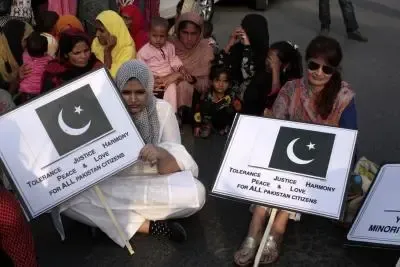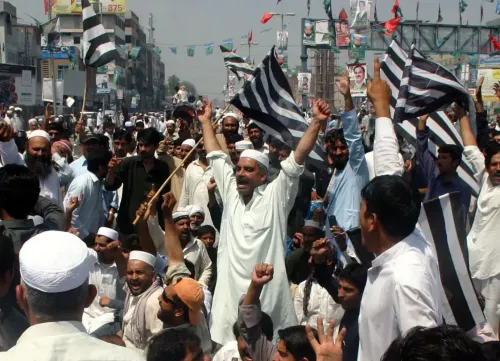Is the Pakistani State Complicit in the Persecution of Minorities?

Synopsis
Key Takeaways
- Pakistan is experiencing a crisis of religious intolerance and persecution.
- Minorities, including Hindus and Christians, face severe rights violations.
- The international community has condemned Pakistan's inaction.
- Forced conversions and underage marriages are rampant.
- Accountability and reform are urgently needed to protect vulnerable populations.
Washington, Oct 14 (NationPress) Pakistan is currently grappling with an escalating crisis of religious intolerance and systematic persecution. Despite facing global condemnation and urgent calls for reform, the nation has consistently failed to safeguard its most vulnerable populations, leading to a landscape marked by shattered lives, desecrated religious sites, and a society increasingly divided by hatred, as detailed in a recent report.
According to Uzay Bulut, a Turkish journalist and Senior Fellow at the Gatestone Institute, the Pakistani State's role in the ongoing persecution of Hindus, Christians, Ahmadis, Shia Muslims, Sikhs, and critical journalists must be addressed. “For years, Pakistan has systematically oppressed its minorities, political dissidents, human rights advocates, and journalists—even extending its reach internationally,” Bulut noted in his article for the US-based think tank.
Despite these human rights violations, Pakistan continues to benefit from the European Union's special trade arrangements under the Generalized System of Preferences (GSP+). This contradiction was emphasized during the United Nations' 60th session of the Human Rights Council (UNHRC), where the international NGO CAP Freedom of Conscience collaborated with EU Today to advocate for a review of Pakistan’s GSP+ status due to its long history of state-sanctioned violations.
On September 30, Baloch human rights defender Joshua George Bowes raised alarms regarding Pakistan's disregard for its international human rights commitments while still enjoying EU trade perks. Referencing the International Federation of Journalists' South Asia Press Freedom Report 2024–25, Bowes pointed out that journalists in Pakistan experienced 34 significant press freedom violations, including seven targeted killings and eight non-fatal attacks, placing the country at the 158th position on the World Press Freedom Index.
The report claims, “Pakistan is engulfed in a deepening crisis of religious intolerance and systemic persecution. This year has seen a troubling increase in violence, discrimination, and institutional complicity, with Christian, Ahmadiyya, and Hindu communities facing significant threats.
In September, the Pashtun National Jirga reported that over 4,000 Pashtuns are still unaccounted for. The Ahmadi community, numbering around 500,000 in Pakistan, has also faced persistent discrimination. Even though Ahmadis identify as Muslims, a constitutional amendment from 1974 categorizes them as non-Muslims.
The Gatestone Institute’s findings reveal that the persecution of Hindus has escalated. On September 17, 2024, armed attackers targeted the Hindu Rama Pir Temple in Sindh, injuring four worshippers. Such violent incidents against Hindu places of worship have become alarmingly common, fostering a climate of impunity that fuels hostility towards religious minorities.
Additionally, the forced conversion and underage marriage of Hindu and Christian girls have surged, with over 1,000 girls abducted annually, typically between the ages of 12 and 25, coerced into conversion, and married to Muslim men. Women and children from religious minorities are particularly vulnerable to kidnapping, forced conversion, and forced marriage; in Pakistan, forced conversion to Islam is not illegal. Authorities seldom take effective action to hold perpetrators accountable, and police often refuse to register complaints from victims or their families.
The global community has expressed rising concerns about Pakistan's inability to protect its minorities. The United Nations and various nations have criticized the Pakistani government for its inaction and demanded immediate reforms. Despite these persistent appeals, significant change remains elusive.
Bulut concludes, “The Pakistani state's involvement in the ongoing persecution of Hindus, Christians, Ahmadis, Shia Muslims, Sikhs, and critical journalists—through silence, legal endorsement, or active participation—must be urgently addressed.”










